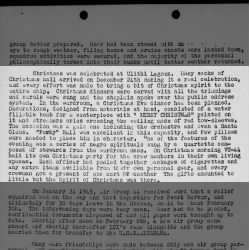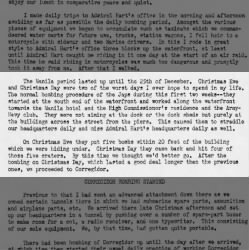

Even far from home, servicemen and women during World War II often tried to celebrate the holidays as best as they could. Check out the excerpts below from the World War II War Diaries for descriptions of some Christmas festivities during the war.
Some servicemen were able to enjoy a more traditional Christmas celebration:
“Christmas dinners were served with all the trimmings and carols were sung and the chaplain spoke over the public address system. In the wardroom, a Christmas Eve dinner had been planned. Decorations, designed from materials at hand, consisted of a water fillable bomb for a centerpiece with ‘Merry Christmas’ painted on it and streamers crisscrossing the ceiling made of red tow-sleeves. The occasion was a gala one including the orchestra and even a Santa Claus.” —VT-44, 1944
Other celebrations were simpler:
“Christmas was like other days. We had a Christmas Church Service. Not many came, it was hot and rainy, and we were working at getting those vital supplies aboard. Our Christmas celebration consisted of a huge meal and a good one, followed by candy, cigars, and cigarettes. It was all that we could expect and we were, if not satisfied, at least content.” —USS Amycus, 1944
Some men tried to decorate for the holiday as best as they could:
“One of the radiomen had picked up a sprouting coconut at Guam. This was our Christmas tree. The electricians rigged up a string of lights, and the mess cook tied small boxes of breakfast food to the tree and a signalman painted a Santa Claus.” —USS Tombigee, 1944
For some, Christmas was business as usual:
“Even on Christmas, we did not enjoy a ‘Silent Night,’ however. Manned air defense stations from 1908 to 1945 and from 2135 to 2201; during the last period, bogies closed to 10 miles and a good deal of AA fire was observed from the beach.” —USS Phoenix, 1944

And for others it was downright terrifying:
“Christmas Eve and Christmas Day were two of the worst days I ever hope to spend in my life. […] On Christmas Eve they [Japanese bombers] put five bombs within 20 feet of the building which we were hiding under. Christmas Day they came back and hit four of those five craters.” —Manila, 1941
Homesickness was common for many during the holidays:
“Everybody tried to be cheerful. But every man knew that he wasn’t fooling anybody, not even himself. For after all, what is Christmas when one is hundreds, or perhaps several thousands of miles from home and loved ones?” —USS Montrose, 1944
But mail from home often cheered them up:
“On arrival, we received our only Christmas presents—mail. What actual Christmas presents we were to receive did not arrive until almost Easter. But the letters from home were a good substitute.” —USS Newman, 1944
Do you have personal or family stories of holidays in the military? Tell us about them! You can find many more stories of holiday experiences in the military by searching on Fold3.
See above webpage.
God Bless our troops, reading these excerps just makes it even more of a blessing for those of us, out of “harm’s way”, to be “home for Christmas”. My wish for Christmas is that all our military make it home for Christmas alive and well. And let’s have peace on Earth, so that these stories will forever remain stories of “Christmas Past”. And all the ingenuity our troops have used to make Christmas happen during war time, is put to celebrating the world at peacandte. I have heard, from my uncle and my father, who both served in WWII, that both the German troops qnd the allies, stopped firing at each other and sang Silent Night.
Thank you for sending these excerps
There is a touching song about the true incident of the soldiers singing together. Look on the internet and you can find it. It always brings tears to my eyes.
from wikipedia: “Christmas in the Trenches” is a ballad from John McCutcheon’s 1984 Album Winter Solstice. It tells the story of the 1914 Christmas Truce between the British and German lines on the Western Front during the Great War from the perspective of a fictional British soldier. Although Francis Tolliver is a fictional character, the event depicted in the ballad is true. John McCutcheon met some of the German soldiers involved in this Christmas story when he toured in Denmark.
see also
http://www.bbc.com/news/uk-wales-mid-wales-35174053
Soldier’s WW1 letter recalls 1914 Christmas Day truce (published yesterday, BBC news)
http://steunenberg.blogspot.com/2015/12/remember-those-past.html
A member of our church, Harry Hoffman, was soldier in the 28th ID whose position was overrun early in the Battle of the Bulge. He spent Christmas Eve in a boxcar with other prisoners on a siding in Germany. He said they started singing Silent Night and the German guard joined in. Other than that, he spent a miserable Christmas.
My father, James T Tolbert, a Technical Sergeant in the Signal Corps, had an orange on Christmas Day. He gave it to a little girl in Belgium who didn’t know what an orange was. However, she very quickly became acquainted with the wonderful tasting fruit.
My dad was drafted in mid-1944 and found himself at a replacement depot in northern Italy at Christmas. He had always enjoying singing in his church choir back home, so he joined the choir for the Christmas service at the replacement depot. He recalled a couple of Jewish soldiers in the choir, they had fine voices, but had to learn the words to some of the hymns. I would love to have a recording of that choir!
After the service, dad said they could hear the German POWs in their compound singing “Silent Night.” At that moment it was very hard to think of them as the enemy.
It wasn’t a happy Christmas, but one my father never forgot. By Christmas 1945, he was back home and singing in his little country church in Virginia.
A gentleman in the veteran’s home where I volunteer told me he didn’t like Christmas. He was wounded on Christmas Eve during the Battle of the Bulge and was not able to be evacuated for some time. He has spent the last 70 years completely blind as a result of that wound.
The story of this brave man really touched me. Here in the Netherlands we have never forgotten the sacrifice of the American servicemen (including the British, Canadian and Polish soldiers) who liberated our country. There are many hundreds of monuments remembering the American and British airmen whose planes were shot down by the Germans over the Netherlands. And at the American cemetery in Margraten every single grave has been adopted by locals and other Dutch people for more than 70 years. We will never forget.
Please give my warmest regards to the gentleman.
Please tell him thank you for your service an the great sacrifice he has paid for or freedom today,an may god bless him the remaining days of his life.
Excellent historic reading, for us son,s and daughter,s of U S servicemen, all these stories bring them a lot closer to our heart,s and memories are reignited of what these men did for all of us without question, sincerest regard,s, D J H, Southhampton, England.
As a child, 1942-43, as I rode to church in back seat of the family car, I counted and looked for changes in the ‘star’ flag’s families hung in their windows. My mother said I got real upset when I saw the blue star change to Gold. I am now 81 years old, but I could visually see the flag’s in windows this Christmas and wondered since WW II to now how many has been lost?
Both grandfathers were in world war two they did not like to talk about it
to much my grandfather on my fathers side always sang waltzing maltida.
My grandfather on my mothers side was in the army and my grandfather
on my fathers side was in the air force.
Sgt. Joseph W. Leone, WWll served in three major battles in European theatre. He spent two Christmas overseas. Years later I would ask him about it and he said they were the worst Christmas of his life. I was a young bride and I spent those Christmases alone crying for him. I still cry at Christmas and when I think of him. I miss him so much. He died eight years ago May he rest in peace.
I am now 92 years old and will join him soon, I would love to tell my story of a soldiers wife.
God bless all the men who served and are serving. You are the ” REAL MEN”. I pray you stay safe
I TOO AM ALMOST 92 AND WE WERE LUCKY TO HAVE HAD A 70YEAR MARRIED YRS, NOW I TOO AM ALONE AND WILL MISS HIM TILL THE END OF TIME . JUST FELT TO SAY THIS MADE ME FEEL BETTER GOD BLESS YOU AND YOURS HUGS COLETTA HOERHELT FOSTER MY SOLDIER WAS RALPH E FOSTER SGT WAS HIS RATEING
Write it down , it can be a.very good story….
My best Christmas present in December of 1944 was a cablegram from my husband Ed saying that he had arrived safely at his destination. I knew he was going to Europe as part of a B-26 crew as a co-pilot. I was glad he had made it safely across the Atlantic Ocean and later learned that he had been on the “Queen Mary” which had been converted to a troop ship. He said it was so foggy in England that you had a hard time finding your way to the mess hall. Ed flew 24 missions over Europe by the time the war ended.
We were fortunate to celebrate 67 years of marriage before he died in January of 2012. There are now five grandchildren and nine great-grandchildren.
That is so wonderful.You also could write a story of you and yours..
WRITTEN ABOVE
I spent a year and a half on the Island of Guam. I was due to return to the US for discharge on January 2nd. I had hoped that I could complete processing early and make it home for Christmas, but it did not happen. My Mother told me that she kept the tree up until January the first. I am still affected when I hear the song, “I’ll be home for Christmas.”
My Dad, Benjamin Garcia, spent part of. WWII on the Aleutian Islands. Christmas Eve 1944 was especially cold with a blinding snowstorm. He had headed back to guard duty but got disoriented. He was finally grabbed by a G.I. who saved his life, as he was headed to a lake not the barracks. Days later when the storm passed another soldier was found frozen to a telephone pole. He daid he was an everyday soldier. But he wrote of the honor of many men, and women and the lives they sacrificed to make this Country the best place to live.
HELLO MY ANCESTOR ABRAHAM CARLOCK HAS (IN MY FAMILY ) OF KILLING 6 BRITISH SOLDIERS AT N.O.HE CLAIMED TO HAVE KILLED A WELL UNIFORMED OFFICER IN THE BRITS 3RD ATTACK THUS ENDING THE BATTLE. HE SAID THAT THE FIRST TWO ATTACKS WERE MOSTLY FREED SLAVES FROM THE ISLANDS THE BRITS PASSED ON THE WAY TO N.O. THE 3RD ATTACK WAS BY THE BLACK WATCH (VETS OF THE PENINSULA WAR)HIS UNIT ROULSONS 3RD WEST TENN.REG. WAS CREDITED WITH PACKENHAMS DEATH.LAST YEAR WHILE IN LONDON I VISITED WESTMINSTER ABBY AND HAD A WONDERFUL CONVERSATION WITH SEVERAL CURATERS AT GEN PACKENHAMS CRYPT .THEY LOVED ABES STORY.NO HARD FEELINGS THANKS TOM